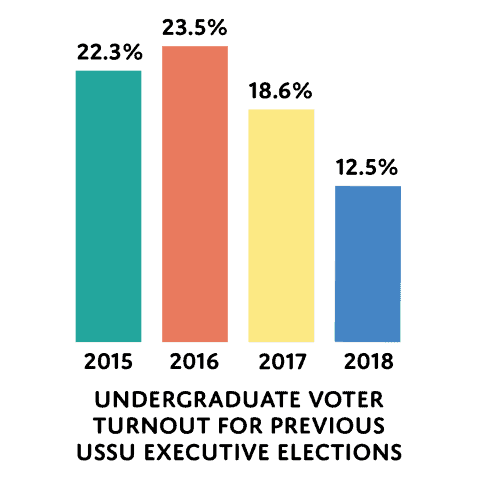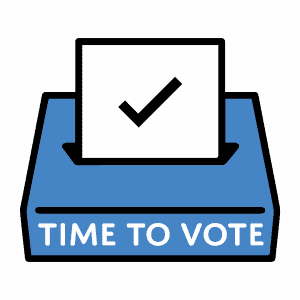There’s an old political maxim that says you can’t complain if you don’t vote. With the University of Saskatchewan Students’ Union by-election drawing near, it’s a good time to better understand the union, the significance of voting and how students can complain more effectively.
From 9:00 a.m. on Oct. 17 to 4:00 p.m. on Oct. 18, undergraduate students at the U of S will be able to cast their votes in a by-election that aims to fill the 12 vacant seats on the University Students’ Council as well as the position of president on the USSU executive. The latter vacancy follows former USSU president Coden Nikbakht’s departure from the union on Aug. 31.
According to USSU election records, the 2018 general election saw the lowest voter turnout in four years, with only 12.5 per cent of the undergraduate body — 2210 of the 17,645 undergraduate students enrolled — voting on the uncontested candidates, as opposed to 18.6 per cent in 2017, 23.5 per cent in 2016 and 22.3 per cent in 2015.
There are any number of reasons that might explain these low voter-turnout percentages, from the busyness of university life to not fully understanding what the USSU does to simply not caring. While there is merit for each of these reasons, the reality of the situation is that, in the last four years, more than 75 per cent of the undergraduate student body has remained unengaged with the union that represents them.
Caroline Cottrell, USSU general manager, says the low voter turnout in the union’s elections is due to situational circumstances rather than a disinterested student body.
“Students engage with the university, their environment and their experience where it makes sense for them to engage,” Cottrell said. “When we did the referenda for the U-Pass, … we had more students vote in one of the referendums than did in the federal election that was going at the same time… It’s not so much an issue of apathy but of a particular interest at a particular time.”
Whether students realize it or not, the USSU’s reach extends far into the experiences of the undergraduate body at the U of S. With an operating budget of $3,022,524 for the 2018-19 year, the USSU is responsible for an array of services significant to the student body. From brokering the student health and dental plan to overseeing the upcoming changes to the transit system, the USSU manages many services that students pay into each semester.
As directors of the organization, the USSU executive are responsible for overseeing many of the services that the union offers. Although the standing executive members have worked towards their platform goals since being acclaimed six months ago, the incoming president will technically be responsible for coordinating them. Subsequently, the president-elect will be able exert their own influences on the direction of the USSU executive and services, while staying within reason of this year’s budget.
Ultimately, the student vote is the primary vetting measure for USSU elections. Each of the candidates for the presidential position will have their own ambitions and goals while in office, and the student vote is the one mechanism that can either reject or legitimize a candidate. This is something that the USSU does not hide.
Cottrell states that, aside from ensuring that candidates are eligible for the position, the USSU is not responsible for judging an individual’s competency or quality.
“It’s not a job application — it’s a democracy. Anyone who meets the basic criteria can run,” Cottrell said. “It’s up to the students who do the voting to determine whether or not [a candidate is] going to be in an elected position for that term.”
Although the by-election may not be a job application for the president-elect, it will end in a job. USSU executives rake in just under $39,000, before taxes, for their year-long term. However, the incoming executive member can expect a pay reduction for the six months that have already elapsed.
Cottrell reveals that student eligibility to run for executive positions is outlined in two legal documents: The Non-profit Corporations Act of Saskatchewan and the USSU Bylaw.
“[Candidates] must be of sound mind, 18 years of age, [25 per cent] of directors must be Canadian citizens and they must not be bankrupt — and that’s under The Non-profit Corporations Act [of Saskatchewan],” Cottrell said. “Under the USSU Bylaw, they must be currently registered students, they must come to an orientation meeting [and] a procedures meeting, [and] they must be in good academic standing.”
While these requirements for eligibility are intended to allow more students to get involved with this facet of campus life, they are also part of what caused the presidential position to become open in the first place. Nikbakht was asked to discontinue his studies after not completing four classes. Under the aforementioned union bylaw, this then made him ineligible to be USSU president.
While Cottrell says she did not consider the general election in 2018 to be controversial — although over 100 students gathered in Place Riel to protest Nikbakht’s acclamation in March — she believes that there is a causal relationship between university scandals and student-voter turnout.
“It has been my experience that, when we don’t have a particular controversy, students are less likely to be engaged with voting,” Cottrell said. “When we have lots of controversy, students are more aware amid the noise of the university, and so they get more engaged.”
Although the voter turnout of the last election seems to be at odds with Cottrell’s claim, students may see the correlation between scandals and voting in the by-election, following Nikbakht’s departure from the organization.

However, reactionary voting due to controversies still means that controversies are taking place. Recent events at the University of Ottawa have suggested the importance of informed student voting, so that controversy doesn’t strike later on down the line.
After a series of fraud allegations were revealed last month, the U of O administration released a statement saying that they would no longer recognize the Student Federation of the University of Ottawa — the U of O’s equivalent of the USSU — as the exclusive organization representing the university’s undergraduate students.
The federation’s president, vice-president operations and executive director were named in the allegations and vacated their positions on Sept. 27.
After the agreement between the U of O and the SFUO is terminated on Dec. 24, the university will no longer collect student fees — meaning that the 35,760 undergraduate students will be without health and dental insurance from Aug. 31, 2019 until a new student organization is formed and works in conjunction with the U of O. Unfortunately, the student body at the U of O is paying the price for their union’s mistakes.
The unfortunate reality of this anecdote is that the SFUO members that are now on the line for fraud were elected — in good faith — by the will of their student body. This is not meant to insinuate that the USSU is on a parallel path to the SFUO. Rather, this situation reveals the importance of students engaging with their student union.
In any election — be it federal, provincial, municipal or collegial — it’s impossible to ensure the efficacy of candidates before they begin the job. The most that students can do on this front in terms of the USSU by-election is to become familiar with the platform points of the candidates for president.
Although there are currently no confirmed candidates yet, campaigning officially begins on Oct. 15 at 12:01 a.m. and platforms will be revealed shortly thereafter.
Even if students are unable to brush up on the candidates’ platforms for whatever reason — be it indifference or busyness — or feel that they don’t support any of the candidate’s platforms, voting to abstain in the by-election is still more beneficial than not voting at all. Not voting has no real impact on the outcome of the election.
There is no minimum number of votes required to legitimize USSU elections. Voting to abstain, however, can have profound impacts on the by-election. The option to abstain is available for students who are not confident about any of the candidates in the election. Effectively, students can use the abstain option as a rejection of all the available candidates.
The USSU Bylaw states that executive members are only acclaimed to office if they get a majority of yes votes. Using the abstain option detracts from the total number of votes for or against a given candidate, rendering this majority more difficult to reach.
Should students be dissatisfied with the results of the by-election, there are still other avenues through which to voice concern. The USSU Bylaw states that a resolution of non-confidence for any given executive member can be passed if a petition containing signatures from 7.5 per cent of the student body — which amounts to 1599 students based on this year’s enrollment numbers — is presented to council.
There are multiple reasons why voter turnout is so low at the U of S, but the truth is that the USSU by-election is going to impact students whether they know it or not. As campaigning begins and the polls open for the USSU by-election, students may realize that it’s easier to complain with their vote, than to complain when it’s all said and done.
—
Tanner Bayne / News Editor
Graphics: Jaymie Stachyruk / Graphics Editor
Leave a Reply